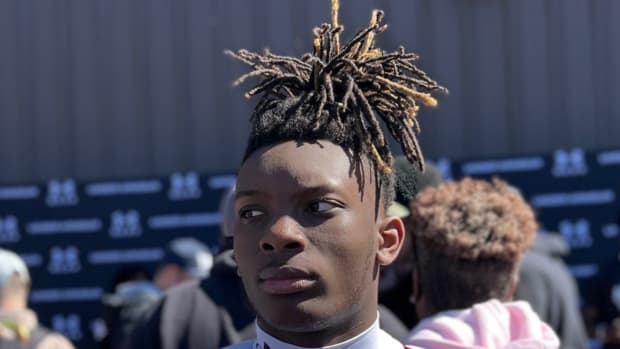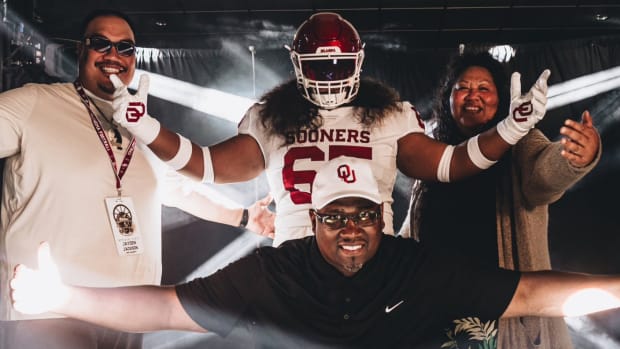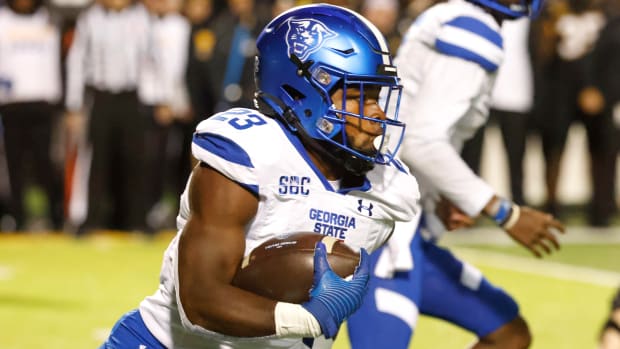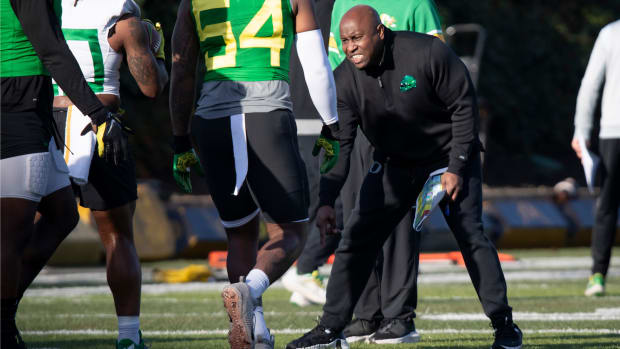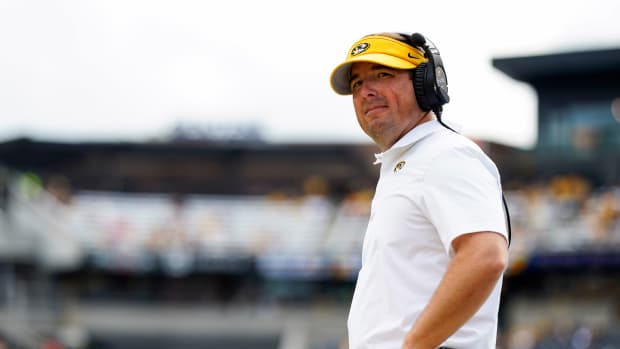Cleared of conduct code violation, what comes next for Jameis Winston
Florida State star quarterback Jameis Winstonhas been cleared by retired Florida Supreme Court Justice Major B. Harding in his code of conduct disciplinary hearing. Winston, who faced potential expulsion, will be able to play for the second-ranked Seminoles when they take on No. 3 Oregon in the Rose Bowl on January 1, 2015, and in the national championship game 11 days later should Florida State advance. The Rose Bowl or national title game is expected to be Winston’s last in college, as signs point toward him declaring for the 2015 NFL draft. But Winston’s legal troubles are not necessarily over. His accuser can appeal the ruling and also file a lawsuit against him.
You have reached your limit of 4 premium articles
Register your email to get 1 more
Harding did not find Winston's accuser's account sufficiently believable
Winston faced four charges, two for sexual misconduct and two for endangerment (violence against another student). Harding had to be convinced by a preponderance of evidence, meaning “more likely than not” or 51 percent, that Winston was guilty. While Harding did not reject the account of Winston’s accuser, he found it no more believable than Winston’s account. “I cannot find with any confidence,” Harding wrote to Winston in a letter obtained by SI.com, “that the events as set forth by you, [your accuser], or a particular combination thereof is more probable than not as required to find you responsible for a violation of the Code.”
Jameis Winston cleared in Florida State Code of Conduct case
Winston and his accuser agreed that they had sexual intercourse on Dec. 6 and Dec. 7, 2012. They disagreed about whether the intercourse was consensual. In his letter, Harding highlighted how Winston and his accuser testified to radically different accounts about what took place in Winston’s bedroom and in an adjacent bathroom. The accuser testified that she never consented and that she told Winston and a teammate of Winston that Winston needed to stop. She also asserted that Winston carried her against her will to the bathroom where, in her words, he continued to sexually assault her. Winston, in contrast, argued that his accuser willingly had sex with him. He also stressed that at no point did she indicate she wanted him to stop. Winston’s teammate, Chris Casher, offered an account that supported Winston’s.
Other evidence failed to sufficiently support the account of Winston’s accuser. The medical exam and testimony of the nurse who treated Winston’s accuser were, according to Harding, “inconclusive.” The exam suggested that the physical symptoms shown by the accuser “could be consistent with either a sexual assault or consensual sexual intercourse.”
Accuser's potential appeal unlikely to impact Winston's playing status
Exploring Adrian Peterson's legal options following failed appeal
Under Florida State's code of conduct, Winston does not enjoy “double jeopardy” protection that would bar him from being retried for the same allegations, and his accuser has five class days to file an appeal. “Class days” are not synonymous with regular days or work days -- they refer to days when school is in session. This is a crucial point since FSU is currently in winter break. As the school's spring semester won’t start until Jan. 7, 2015, Winston’s accuser has until Jan. 14, 2015 to request an appeal.
The “class days” provision greatly benefits Winston and virtually ensures that he will play in the Rose Bowl and the national championship game 11 days later if the Seminoles qualify. Florida attorney Daniel Wallach, an appellate expert with Becker & Poliakoff in Fort Lauderdale who is familiar with Florida State's code of conduct, tells SI.com that “even if she files an appeal tomorrow, there is no possibility that a reversal would keep Jameis Winston from participating in the Rose Bowl or the national championship game.” This is because under the code of conduct, an appeal hearing would be scheduled within 10 class days of the university receiving the request, and any resulting decision would be communicated in writing within 15 class days of the hearing. “Even if the accuser succeeded on appeal and were able to do so quickly,” Wallach observes, “the earliest that any reversal could occur as a practical matter would be in February 2015. By that time, Jameis Winston will likely have dropped out of school and would be preparing for the NFL draft.”
Narrow grounds for appeal under code of conduct
In addition to an appeal likely having no impact on Winston’s eligibility for the Rose Bowl or potential national championship game, the accuser has very limited grounds to appeal. Under the code of conduct, she would need to raise one of three grounds, each of which would be difficult to show. She would have to establish that (1) a fundamental due process error occurred; (2) the hearing officer was biased; or (3) there is “newly discovered evidence” that warrants the outcome be changed.
Wallach is skeptical that the accuser can win an appeal. “Each of these grounds is, to put it charitably, a long shot at best, and an impossibility at worst,” Wallach tells SI.com. “A due process argument would likely fail because the FSU Student Conduct Code arguably gives a complainant more substantive rights than it does an accused. And there is virtually no chance that [an] FSU appellate hearing officer -- who would likely be an employee of the school or perhaps another retired Supreme Court Justice -- would find that Major Harding, a respected former Supreme Court Justice, was biased or prejudiced against the accuser.” Wallach also believes that Winston’s accuser “would be hard-pressed to argue that Harding was biased against her or had a conflict of interest when she did not object to his serving as the hearing officer.”
If Winston’s accuser does appeal, expect her to assert that Harding was pressured by some factions of the Florida State community to ensure that Winston be available for the postseason. “Pressure or influence that precluded a fair or impartial hearing,” notes Wallach, is one of the available grounds for appeal under the code of conduct.
Hearing records can be used against Winston in civil lawsuit
Antitrust lawsuit, if successful, could unravel the UFC
While Winston is surely relieved to prevail in his disciplinary hearing, his accuser remains poised to sue him. It is at least theoretically possible that a jury reviewing a similar set of evidence and witness testimony but operating under different procedural and evidentiary rules might reach a different conclusion than Harding. The accuser can also raise claims in a lawsuit that are not available under the code of conduct, such as intentional infliction of emotional distress.
Along those lines, one significant downside for Winston in participating in the code of conduct hearing, as opposed to dropping out of Florida State to prepare for the NFL draft, is that hearing records are now evidence that Winston’s accuser could likely use against him in a lawsuit. According to the code of conduct, while release of student records is “governed by applicable federal and state laws regarding the privacy of education records,” they are subject to subpoena. The creation of records is one reason, Wallach says, for Winston’s accuser to file an appeal with Florida State even if Winston drops out of school before the NFL draft and his university standing becomes moot: “I still expect her to pursue an appeal if only to help build a case against FSU and Jameis Winston in later civil judicial proceedings.” In a code of conduct appeal, Winston’s accuser can also call on new witnesses and raise new evidence, thus providing her greater incentive to appeal.
Florida State is also in possession of hearing records for Winston, an important point given that Winston’s accuser is poised to sue both Winston and the school (and potentially the Tallahassee Police Department). Should Winston and the university become co-defendants, Florida State may have incentives to direct blame onto Winston.
Michael McCann is a Massachusetts attorney and the founding director of the Sports and Entertainment Law Institute at the University of New Hampshire School of Law. He is also the distinguished visiting Hall of Fame Professor of Law at Mississippi College School of Law.
